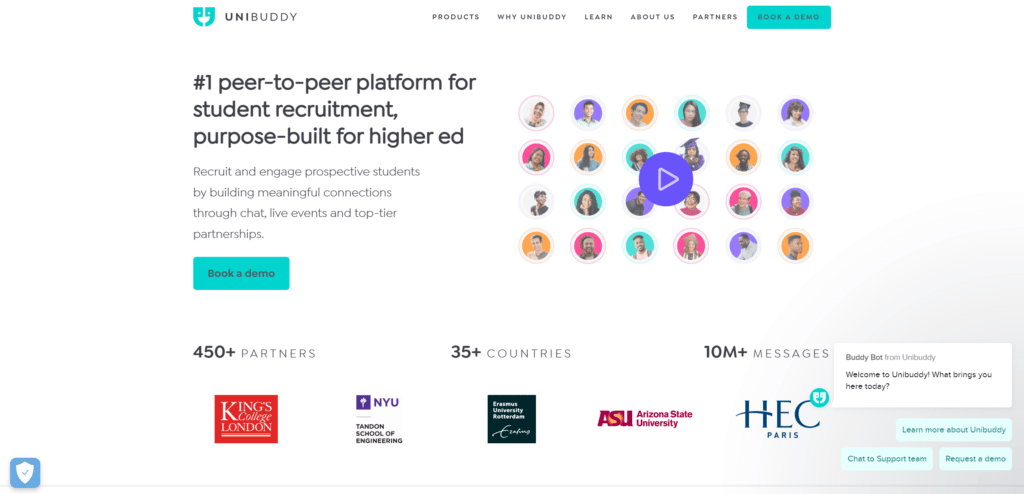How Small Colleges Can Stand Out: Why Your Mission Is More Important than Ever
Learn how small colleges can stand out by using mission-fit marketing to attract the right students and increase enrollment effectively.
Marketing Strategies
Creating a sense of belonging is a powerful way for your school to cultivate new students. In this post, we explore how you can leverage this concept to boost your admissions results.
One of the greatest needs we have as human beings is to belong to a tribe.
“A tribe is a group of people connected to one another, connected to a leader, and connected to an idea. For millions of years, human beings have been part of one tribe or another. A group needs only two things to be a tribe: a shared interest and a way to communicate.”
– Seth Godin, Tribes: We Need You to Lead Us
If you can connect prospective students with current students and others at your institution, you can help create that sense of belonging.
By showing your prospective student that they can become an important and connected part of your tribe, you’ll answer one of their biggest questions…
Is there a place for me here?
There are several platforms out there that can help enrollment marketers and recruitment staff create one-on-one relationships with prospective students.
But there’s been one I’ve been following for a while because of their unique approach.
My co-host, Troy Singer, and I got to interview Diego Fanara, Cofounder & CEO at Unibuddy, on how their platform helps facilitate peer-to-peer connections that promote belonging.

Whether you decide to use a tool like Unibuddy or not, I think you’ll get a lot out of the conversation about how you can leverage this powerful concept to boost your enrollment efforts.
For decades, education marketers have been trying to give prospective students a glimpse into the everyday life of current students.
Through blogs and social media accounts, schools have done their best to show prospective students the excitement of student life.
But I really like the idea of creating prospective students to affinity groups on your campus.
In other words, by connecting prospective students to current students with whom they have an affinity (such as a shared experience, background, set of values, or social group), you can help them make a personal connection with your school.
It’s the importance of community and tribe. We believe that students consider an institution because of [the school’s course offerings], their location, or a lot of [other] parameters, but they convert for the community.
Also, they stay at the institution because they feel they belong. So what they need is to be able to see what the community is like, to meet peers. A peer is someone of the same age, background, or ability as another person. It could be someone who shares experiences and similarities with [the prospective student]. In higher education, this is an incredibly powerful notion.
– Diego Fanara
One way to create connections with affinity groups at your school is to develop student ambassadors.
Student ambassadors are active, enthusiastic members of your student body who make ideal representatives of your school.
Typically, these students are involved in athletics, student organizations, study abroad programs or other kinds of campus initiatives your prospects could be interested in.
They don’t need to be perfect students, but they should represent the kind of student that you would like to have more of.
These student ambassadors can be leveraged to write blog posts, post content on social media, contact prospects, lead campus tours, and other kinds of recruitment activities.
[Affinity groups and student ambassadors] offer a more level playing field using the power of student diversity to connect people. So having those trusted voices for students [can help prospective students] assimilate themselves.
This is where you can rise above the noise to [help prospective students] meet someone who is currently experiencing [campus] life and aspires [to experience it] for themselves. That’s when connections happen. It unleashes [prospective] students to have clarity and confidence to make the leap and make the right decisions.
I think we all recognize that having prospective students make connections with current students is a powerful way to help them decide to enroll.
One of the tried-and-true methods for making connections between prospects and students has been the in-person campus visit.
The connections made on campus visits are so powerful that I believe between 80 and 90 percent of those who visit your campus will eventually matriculate.
However, institutions are turning more and more towards technology to help them make these personal connections, whether through in-person or virtual tours.
We’re trying to use digital and technology to make [the connections] universities were already doing, but at scale. And not “at scale” in a way that they spend less time or where we just use technology to replace all human connection. It’s actually to scale one-to-one intimacy. That’s what students want.
That’s why 1000’s of prospective students email the admission team. [It’s] because they prefer the intimacy of a one-to-one conversation, either by email, or by coming on campus. Student-to-Student marketing allows [you to] effectively scale the intimacy of those campus visits for students that are not able to [come physically] because they live far away or internationally.
[We’re always thinking] of how we can scale intimacy. The best way to deliver this is to invite students to be marketers themselves.
If you’re interested in seeing how technology can help you scale one-to-one relationships with prospective students, try out a demo of Unibuddy here.
Like all of our blog post reviews of The Higher Ed Marketer podcasts, there’s so much more to learn in the podcasts themselves.
Listen to our interview with Diego Fanara to get even more insights into:
You’re in luck! We’ve curated 25 awesome ideas inspired by top higher ed institutions across the country and put them in one handy guide: 25 Ideas for Great Admissions Content.

Get inspired.
Get enrollment results.
Get 25 Ideas for Great Admissions Content.
Download your copy today!
Featured image by Valerii via Adobe Stock
Subscribe to The Higher Ed Marketer podcast today!